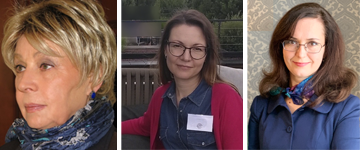Abstract
In the context of the reformation of the higher education in Ukraine the preparation of translators and interpreters requires new approaches to the process of teaching and learning. It presupposes the implementation of ways and forms aimed at active rather than passive learning, an increased sense of academic autonomy, development of motivation, responsibility and accountability in acquiring profession-specific knowledge, skills, communicative abilities and attitudes as well as interdependence and mutual respect between the academic teacher and the student.
The authors of the article argue that the language tuition to students majoring in translation studies contributing to the overall development of their professional competence of intercultural mediators can be carried out in the form of extra-curricular activities via information and communication technology tools.
With respect to the results of the grounded study of current tendencies, achievements and problems, valuable experience and outcomes related to the issue under consideration, the paper reflects on two extra-curricular activities, their stages, aims, objectives and tasks performed; analyses their importance and efficiency in promoting students’ autonomy and responsibility; outlines the role and the functions of information and communication technology tools used.
The English Speaking Club involves specially arranged meetings intended to provide practising English autonomously outside the classroom context. Participating in conversations with a native speaker students have the opportunity to improve their vocabulary, grammar, pronunciation skills, enrich their background knowledge of traditions and culture of the English-speaking countries as well as overcome psychological barriers while expressing personal views and ideas.
Translation and Voice Over Recording Studio is organised as a project activity tailored to initiate student translators and interpreters to the real workflow of a project team specialising in translation of different types of audio and video texts in the English language into Ukrainian and their further voice over recording. Performing roles of translators, proofreaders, editors, voice-over artists and sound directors, the participants have the opportunity to practically implement knowledge, skills and communicative abilities obtained while learning profession-specific subjects at the university, developing and improving translation and interpretation skills in particular. Specially selected information and communication technology tools provide the efficient organisation of the Club’s and Studio’s work.
References
D. Toffoli and G. Sockett, "University teachers’ perceptions of Online Informal Learning of English (OILE)", Tandfonline.com, 2013. [Online]. Available: https://www.tandfonline.com/doi/full/10.1080/09588221.2013.776970. Accessed on: Feb. 09. 2019. (in English)
Stratehiia reformuvannia vyschoi osvity v Ukraini do 2020 roku. (Proekt). [Strategy of reformation of the higher education in Ukraine till 2020. (Draft)], 2015. [Online]. Available: http://search.ligazakon.ua/l_doc2.nsf/link1/NT1109.html. Accessed on: Feb.02.2019. (in Ukrainian)
UNESCO, “Information and communication technology in education. A curriculum for schools and programme for teacher development. Division of higher education”, 2002. [Online]. Available: http://unesdoc.unesco.org/images/0012/001295/129538e.pdf. Accessed on: Feb.02.2019. (in English)
EMT Expert Group, “Competences for professional translators, experts in multilingual and multimedia communication”, 2009. [Online]. Available: http://ec.europa.eu/dgs/translation/programmes/emt/key_documents/emt_compet ences_translators_en.pdf. Accessed on: Feb.02.2019. (in English)
National Occupational Standards in Translation, CILT, the National Centre for Languages, 2007, 40 p. (in English)
N. Rashevska, Mobile information-communication technologies of teaching advanced mathematics to students of higher technical educational establishments, Ph.D, Institute of Information Technologies and Learning Tools of the NAES of Ukraine, 2011. (in Ukrainian)
Y. Matviyiv-Lozynska, "Use of information technologies in educational extracurricular activities in higher tourist institutions", Journal.iitta.gov.ua, 2013. [Online]. Available: https://journal.iitta.gov.ua/index.php/itlt/article/view/801/637. Accessed on: Feb.10. 2019. (in English)
O. Martynenko, "Audiotexts’ selection criteria for teaching correspondence future Interpreters listening comprehension in English", The scientific and methodological journal “Foreign Languages”, 2016. [Online]. Available: http://fl.knlu.edu.ua/article/view/122572/117403. Accessed on: Feb.10.2019. (in Ukrainian)
"Social Media Stats Ukraine . StatCounter Global Stats", StatCounter Global Stats, 2019. [Online]. Available: http://gs.statcounter.com/social-media-stats/all/ukraine. Accessed on: Feb.10.2019. (in English)
R. Börekci and S. Aydin, "Foreign language teachers’ interactions with their students on Facebook", https://www.tandfonline.com, 2019. [Online]. Available: https://www.tandfonline.com/doi/abs/10.1080/09588221.2018.1557691?af=R&journalCode=ncal20. Accessed on:Feb.10. 2019. (in English)
L. Yatsenko and Ya. Fabrychna, Project work as a form of extra-curricular activity for student translators and interpreters, Proceedings of 2nd International Conference on Language Research and Teaching in the Global Economic Environment, KNU, Kyiv, Ukraine, 2016, pp.81–85. (in Ukrainian)
Authors who publish in this journal agree to the following terms:
- Authors hold copyright immediately after publication of their works and retain publishing rights without any restrictions.
- The copyright commencement date complies the publication date of the issue, where the article is included in.
Content Licensing
- Authors grant the journal a right of the first publication of the work under a Creative Commons Attribution-NonCommercial-ShareAlike 4.0 International License (CC BY-NC-SA 4.0) that allows others freely to read, download, copy and print submissions, search content and link to published articles, disseminate their full text and use them for any legitimate non-commercial purposes (i.e. educational or scientific) with the mandatory reference to the article’s authors and initial publication in this journal.
- Original published articles cannot be used by users (exept authors) for commercial purposes or distributed by third-party intermediary organizations for a fee.
Deposit Policy
- Authors are permitted and encouraged to post their work online (e.g., in institutional repositories or on their website) during the editorial process, as it can lead to productive exchanges, as well as earlier and greater citation of published work (see this journal’s registered deposit policy at Sherpa/Romeo directory).
- Authors are able to enter into separate, additional contractual arrangements for the non-exclusive distribution of the journal's published version of the work (e.g., post it to an institutional repository or publish it in a book), with an acknowledgement of its initial publication in this journal.
- Post-print (post-refereeing manuscript version) and publisher's PDF-version self-archiving is allowed.
- Archiving the pre-print (pre-refereeing manuscript version) not allowed.


